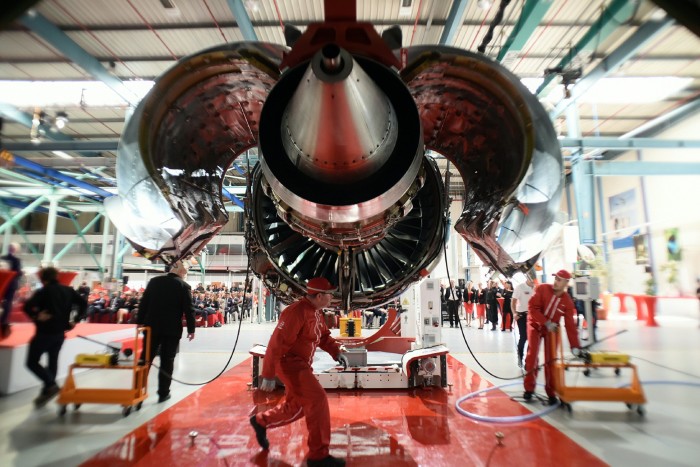[ad_1]
Northvolt, Europe’s great hope in the global battery wars, began life as a start-up focused on the continent. Now the Swedish group, backed by Volkswagen, BMW and Goldman Sachs, is looking to the US to expand production.
The reason for the pivot is the Inflation Reduction Act (IRA). The US’s flagship green technology legislation, signed into law in August, would subsidise a factory in America by about $600mn-$800mn, according to Northvolt. That compares to €155mn in incentives on the table from Germany.
The IRA “is moving momentum a lot from Europe to the US”, Northvolt chief executive Peter Carlsson told the Financial Times, adding that it was not only affecting European companies. “There are new Asian players who are reallocating their strategic plans and investments to North America,” he said.
The combination of the Biden Administration’s $369bn package and high energy costs in Europe, where even after recent declines gas prices remain five times more expensive than in North America, is sounding alarm bells in EU capitals.
“I think we need a European wake-up on this point,” French president Emmanuel Macron told executives from domestic industrial companies such as glassmaker Saint-Gobain and cement maker Lafarge in a speech last week.
Germany’s economy minister, Robert Habeck, described the US support as “excessive” and “hoovering up investments from Europe”.

The EU has accused Washington of breaching World Trade Organization rules and set up a task force with the Biden administration to resolve their differences. It has asked for changes to nine provisions in the legislation involving subsidy programmes totalling $231bn, arguing they create a “race to the bottom” on handouts to business.
Brussels estimates the EU needs to boost annual investment by €520bn in the coming decade to meet its carbon reduction and environmental protection objectives.
While the IRA affects manufacturers in fields ranging from advanced machinery to heavy industry, EU executives are particularly concerned about the impact on the automotive sector. Only electric cars substantially made with parts from North America and assembled there will qualify for a $7,500 tax discount for consumers.
Europe is home to more than one-quarter of global EV production, and 20 per cent of the supply chain, according to the International Energy Agency. The US has just 10 per cent of EV production and 7 per cent of battery production capacity.
Luisa Santos, deputy director-general at BusinessEurope, a pan-European lobby group, said the US legislation had sent a “dangerous signal” that could encourage other jurisdictions to take protectionist measures.
Yet far from offering to extend the break to EU vehicles, Katherine Tai, the Biden administration’s most senior trade official, told the FT that the EU should introduce more subsidies.

While she expressed “every confidence” of finding a resolution, it remains unclear what concessions the US could make without involving Congress, which is unlikely to reopen the act.
Carlos Tavares, head of Franco-Italian carmaker Stellantis which is also home to big US brands like Chrysler, is among executives who have publicly called for Europe to consider reciprocal measures or changing its rules. State-funded electric car purchase subsidies in France, for example, apply to all vehicles regardless of origin or manufacturer.
A speedy solution for electric vehicles is possible. Last week three members of Congress introduced a bill that would delay the IRA’s requirement for North American supply chains by three years, since many US carmakers will struggle to make the necessary changes before then.
EU officials are reluctant to match US subsidies or, according to one official, “do things that are incompatible with WTO and state aid rules”.
“We designed our rules to be open and not give preferences to European companies: now we are victims of our own purism,” they said.
German finance minister Christian Lindner told the FT: “We won’t prevent European companies disinvesting and moving to the US . . . by entering into a competition for subsidies, but by creating really excellent conditions for investment in Europe.”
In contrast, France has been pushing for the EU to adopt its own “buy European act” as it seeks to tip the playing field back in its favour.
“Europe cannot be the only place in the world that doesn’t have a Buy European Act and the only place in the world where you still have a state aid system that sets rules as if there was no external competition,” Macron said last week.
The European Round Table for Industry, a business lobby group, argued that Washington’s carrot-based approach could help the US overtake Europe in its adoption of green technologies. It said that regulatory uncertainty in the EU was hindering green technology, calling for a “concerted effort” to speed up the permitting of renewable investments.
Spain’s Iberdrola, among the world’s biggest energy companies, is lifting US investment to almost half of its global total from 2023-25, compared with 23 per cent in the EU. Ignacio Galán, executive chair, told the FT that the US was now a “very much” more appealing place to invest.
For renewably produced hydrogen, for example, the US was providing about $100bn of support under the IRA while the EU was offering just $5bn, he said.
Compounding the pressure is the higher cost of energy in the EU. France’s Safran, a leading supplier of aircraft engines and other parts, is among the companies rethinking its investment plans.

It had been planning a second factory near Lyon focused on lightweight carbon brakes that was earmarked to become a research hub for the technology. But now it is shunting more of its landing gear production to Asia and the US as it puts off any decision on the new French plant for at least another 18 months.
“My duty is to ensure any investment is economically viable,” chief executive Olivier Andriès said recently. Despite efforts to hedge against price rises, Safran’s French power costs were on course to increase nearly fivefold between 2019 and 2023, Andriès said, while they had remained stable in the US and Malaysia, where the group also produces carbon brakes.
“It’s not just a question of getting through the winter. There’s a much deeper issue at play, it’s about the competitiveness of France and Europe,” he said.
Reporting by Sam Fleming and Andy Bounds in Brussels, Richard Milne in Stockholm, Sarah White in Paris, Guy Chazan in Berlin and Barney Jopson in Madrid
[ad_2]
Source link